| Srl | Item |
| 1 |
ID:
176082
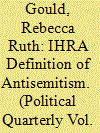

|
|
|
|
|
| Summary/Abstract |
The IHRA definition is one of the most contentious documents in the history of efforts to combat antisemitism. Although it first became well known in the UK as a result of disputes within the Labour Party, the definition reaches well beyond that context, and has been adopted by universities, city councils, and governments. With its intensive focus on the critique of Israel as a marker of antisemitism, the IHRA definition has been heavily implicated in the suppression of Israel‐critical speech in recent years. This article is among the first to adopt a global perspective on the definition—both its history and its content—clarifying the political stakes of this definition and broader paratextual apparatus for a general audience, and provides an explanation of why it should be rejected rather than used to censor Israel‐critical speech.
|
|
|
|
|
|
|
|
|
|
|
|
|
|
|
|
| 2 |
ID:
158829


|
|
|
| 3 |
ID:
111963


|
|
|
|
|
| Publication |
2012.
|
| Summary/Abstract |
Many observers have argued that social media such as Facebook and Twitter will help opposition activists coordinate and overcome authoritarian regimes; others believe that such tools will have little impact. Evidence from the "Arab Spring" is inconclusive, with advocates for each position finding support in the events in Tunisia, Egypt, and elsewhere. When does social media help political movements succeed? Motivated by an experience serving as a "campaign manager" for a colleague's bid to become the Washington Post's "Next Great Pundit," I argue that relying on Internet-based social networking tools (such as Facebook and Twitter) may lead campaigns to perform more poorly when the regime is able to change the election's rules in mid-campaign. Consequently, researchers observing only the messages broadcast by social media will miss the true coordination taking place, which happens through channels unobservable to the regime. Examples from Middle Eastern politics suggest that real-world political activists recognize these distinctions and adjust their messaging accordingly.
|
|
|
|
|
|
|
|
|
|
|
|
|
|
|
|
| 4 |
ID:
133774
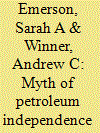

|
|
|
|
|
| Publication |
2014.
|
| Summary/Abstract |
U.S. politicians often work the topic of oil import independence into their campaign rhetoric as an ideal that would help separate U.S. economic prosperity and military responsibility from the volatility of Middle Eastern politics. In theory, oil independence would mean that events such as the Iranian revolution or internal political unrest in key Arab oil producers would have much less direct impact on the flow of oil to the United States, and thus U.S. prosperity (even if, in a global market for oil, the price impact of any supply disruption is shared by all consuming countries). More importantly, intra-state conflicts such as the Iraq-Iran war or the Iraqi invasion of Kuwait would not necessarily require large-scale U.S. military involvement to ensure oil production and exports to the United States and its allies. This linkage between U.S. oil import dependence and military commitment to the Gulf region has given rise to a myth favored by policymakers, markets, and the public that if the United States could attain oil independence, we could also reduce our military responsibilities around the world. Recent and ongoing changes in both the oil sector and in political-military strategy are for the first time in forty years combining in a manner that is leading some to believe this story could come true.
|
|
|
|
|
|
|
|
|
|
|
|
|
|
|
|
| 5 |
ID:
058960
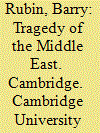

|
|
|
|
|
| Publication |
Cambridge, Cambridge University Press, 2002.
|
| Description |
viii, 287p.pbk
|
| Standard Number |
0521603870
|
|
|
|
|
|
|
|
|
|
|
|
Copies: C:1/I:0,R:0,Q:0
Circulation
| Accession# | Call# | Current Location | Status | Policy | Location |
| 049199 | 956.04/RUB 049199 | Main | On Shelf | General | |
|
|
|
|
| 6 |
ID:
129879
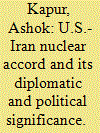

|
|
|
| 7 |
ID:
158822
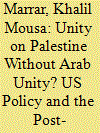

|
|
|